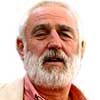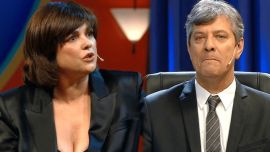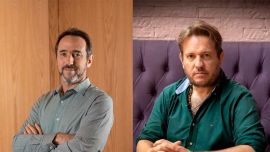Try sparing a few seconds, or even gamble some minutes, wondering how Presidents are remembered in Argentina. A little, a lot, not at all: you will find that deciding merit is a difficult exercise. In a nation with a very short memory for public incidents and our political past – outside of the history of first division football, of course – few want to recall the complex events of the past outside of the plastic patriotism of things such as Independence Day and others that are imposed on schoolchildren. The memory element there seems unnecessary because most of what goes for history in the mid-year celebrations are mostly noticed as long weekend breaks.
For many, Juan Perón (1946-1955) is seen as the great man of Argentina’s 20th century, even if nobody ever finished auditing his spending and gains. President Arturo Frondizi (1958-1962) has been steadily “revalued” over the past four decades by followers of his “developmentalist” policies. A former member who split the Radical party in 1956, Frondizi is seen as one of the great planners of the post-Perón years. Arturo Umberto Illia (1963-66), the Córdoba country doctor who became president when his own Radical party never thought he could win (with 23 per cent of the vote, it must be said), thought a peaceful nation was possible. However, all three were removed from office by mini-minded generals whose life ambition was to become presidents, elected by a vote of three (the chiefs of the Armed Forces). And then we take a quality leap to Raúl Alfonsín (1983-1989), the humanist and courageous politician now regarded as the best we have in statesmanship, in his human rights actions and in the 1985 trials of the Armed Forces commanders of the 1970s. Yet Alfonsín failed to stare down economic disaster and introduced the country to Weimar-style emergency.
His successor, Carlos Saúl Menem, will get some acknowledgement with time, even if it will weigh heavily on his extravagance in every aspect of his high office. However, his team did bring an end to hyperinflation, opened the way to building up Puerto Madero, and opened up Argentina’s diplomacy, with serious mistakes in his handling of war weapons sales.
The thought arises obviously as week after week for many months and further on we get an overwhelming dose of presidential corruption recorded in the time running from mid-2003 to December 2015. The impressive fundraising programme of the Presidential Couple Co., a for profit-making executive organisation, precipitates reflection on the ways and wonders of politics in Argentina and the measure of memory of public figures who live their terms and seasons close to local treasuries. However, another (personal) reason for running through the activities of functionaries who came and went, springs from men and women who, on leaving office, had several brand-new cars, several homes and clubs, fingers in local business, from smalltown mayors to presidents.
While thinking of them in the street, an overheard conversation between two building workers on a scaffold referred to Carlos Saúl Menem. One man said to the other, “Remember how good things were when the peso was worth a dollar?” And the second man remarked, “Well, but that was with Menem… It’s different now…” It was quite surprising to hear such a remark.
Another form of punctuating difference between pre-2015 and in post-Macri terms was stated by multi-millionaire truck drivers’ leader and president of my club, Independiente CAI, among whose critical remarks about the current leadership and appreciation of the past was that “at least with Cristina we could eat!!” Presumably such appreciation should be countered with the question, “For how long, for how much? And who has hidden the cash to pay for a meal or two?” Mauricio Macri might like the question if he can tell pensioners that they might see some crumbs at Christmas.
And in a look through old files there is a revelation of an apparently heartfelt observation by former Cabinet chief Alberto Fernández who said in an interview in October 2013 that, “Néstor Kirchner was the best President Argentina had.” Did he really believe what he was saying? was it stated simply because he was NK’s first campaign organiser and cabinet chief and felt he had to say it? Or was he simply being a Peronist who does not care if anybody will remember his words in a few weeks’ time? Others have heard such praise for Kirchner for ordering the Army chief-of-staff, general Roberto Fernando Bendini (some nationalists called him “saleable” or “bendible,” in Spanish) to remove the portraits of ex-generals and former de facto presidents (1976-83) Jorge Rafael Videla and Reynaldo Bignone (a name that has the unkind ring of a “big none” or “big nothing”) in the gallery of pictures of former directors of the National Army College at Campo de Mayo in March, 2004.
Still more feel that the cancellation of Menem’s pardons for the criminals of the 1970s by the Supreme Court in July 2007 opened a road toward coming to terms with the past. No doubt it was a political masterstroke by Kirchner, but it was also a form of political distraction and often a display of vengeance. Many celebrated the cancellations of the cheapest of debts, for loans with the International Monetary Fund (IMF), in December, 2005.
However, there are now clear indications that the robbery of some US$400 million, stashed away in travel bags will be the clearest memory of the Kirchners. Néstor, the son of a loan shark and himself a mortgage swindler, once said you could not grow in politics without money. And he loved seeing it pile up. Will his name remain on public buildings and streets?
There are still people convinced that we are living through a major financial show. It is not easy to accept their rejection in view of such strong allegations in the corruption coverage, for example, since journalist Jorge Lanata tried to visit a family hotel in Patagonia during Cristina Fernández de Kirchner’s government. We’re not just reading/seeing her financial product now. The information dates back years, and now even television presenters try to look surprised.
Will Argentina arrive at a true account of 12-year rule by the
Kirchner family? Or will society continue to wait for this chapter
to close, the court actions to be covered in dust, and the historians
and social analysts to look at events from different angles. It is
not easy to believe that Argentina will change, even
if it is best to hope that we can.related news




















Comments